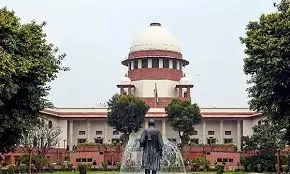Pollution bodies vacancies: SC issues contempt notices to chief secretaries of Delhi, NCR states

New Delhi, May 8:
In a strong rebuke to the governments of Delhi, Uttar Pradesh, Haryana, and Rajasthan, the Supreme Court of India issued contempt notices on Wednesday for failing to appoint key officials in their State Pollution Control Boards (SPCBs). The apex court expressed deep dissatisfaction with the prolonged vacancies and temporary appointments in these critical environmental bodies.
A bench headed by Justice Abhay S. Oka, along with Justice Ujjal Bhuyan, criticized the state governments for their failure to comply with earlier court orders. The court noted that these appointments had been pending for months, despite repeated directions.
“The failure to make appointments is wilful disobedience of our earlier orders,” the court observed, warning that such disregard for judicial directives could not go unchecked.
Why Pollution Control Boards Matter
Pollution Control Boards serve a crucial role in regulating industrial emissions, monitoring air and water quality, and ensuring compliance with environmental laws. In pollution-prone areas like the National Capital Region (NCR), their role is even more important.
Yet, many of these boards remain either leaderless or run by ineligible bureaucrats holding additional charges. Experts have repeatedly flagged this as a major reason for weak environmental enforcement in India.
The Supreme Court had previously instructed states to appoint qualified professionals with backgrounds in environmental science, engineering, or related disciplines. However, the reality on the ground tells a different story.
Court Expresses Serious Concern
During the hearing, the Supreme Court made it clear that temporary arrangements and vague promises would no longer suffice. The court emphasized that public health was at stake and pollution could not be tackled without capable leadership in regulatory bodies.
The bench said, “Environmental protection is not a part-time responsibility. Appointing bureaucrats without relevant expertise undermines the seriousness of the issue.”
In the same hearing, the court directed the Chief Secretaries of all four states to personally submit affidavits explaining why permanent appointments had not been made. These affidavits must also include the timeline within which they plan to resolve the vacancies.
Background of the Case
This development stems from a long-standing Public Interest Litigation (PIL) seeking stricter enforcement of environmental laws across India. Earlier, the court had passed specific orders requiring the appointment of qualified officials to lead the SPCBs.
Despite clear directions, key positions like Chairperson and Member Secretary remain vacant in several states. In some cases, government officials with no environmental background were given charge of these posts.
The court viewed this as a violation of both legal mandates and judicial orders, especially considering the critical pollution levels in NCR states. These states consistently rank among the worst in terms of air quality, with cities like Delhi and Ghaziabad frequently topping global pollution charts.
Expert Reactions
Environmental activists and legal experts welcomed the Supreme Court’s move. Many believe this will push state governments to take environmental governance more seriously.
Sunita Narain, Director General of the Centre for Science and Environment (CSE), said, “We cannot fight pollution without effective institutions. SPCBs must be led by professionals, not career bureaucrats.”
Legal analyst Vikram Patel noted that the court’s decision sends a strong message. “Contempt proceedings are not common in environmental matters. This shows the urgency and frustration of the judiciary,” he added.
What Could Happen Next
If the states fail to provide satisfactory responses, the court may initiate full-fledged contempt proceedings. This could lead to penalties and further directions that compel the states to act without delay.
The Supreme Court has a track record of taking strict measures in environmental matters, especially when there is non-compliance with its orders. For instance, it has previously ordered shutdowns of polluting industries and imposed fines on defaulting bodies.
The next hearing is expected to focus on the affidavits submitted by the states. If the court finds the explanations inadequate, it could order personal appearances of top officials or even summon the environment ministers.
A Wake-Up Call for Environmental Governance
This issue also highlights a larger problem in India’s environmental governance — the lack of skilled manpower and political will. While India has several laws to protect the environment, enforcement often falls short due to institutional weaknesses.
Vacancies in pollution control boards are just one example of how environmental protection is often treated as a low priority. Without strong leadership, these bodies cannot take on powerful polluters or implement regulations effectively.
The Supreme Court’s strong intervention serves as a wake-up call for both the states and the central government. With pollution levels in NCR continuing to harm public health, urgent action is no longer optional — it’s a necessity.
Final Words
The Supreme Court’s decision to issue contempt notices marks a turning point in the ongoing battle against environmental negligence. If state governments fail to act now, they may face legal consequences — and more importantly, continued public health disasters.
As India grapples with toxic air, contaminated water, and rising health costs, it’s clear that without robust and well-staffed institutions, environmental protection will remain a distant goal. The ball is now in the states’ court — and the clock is ticking.






